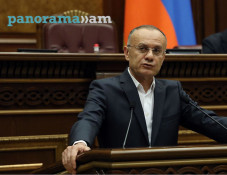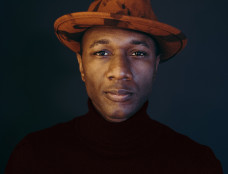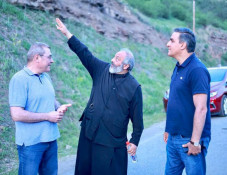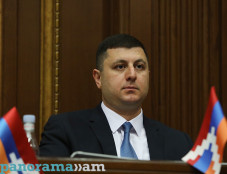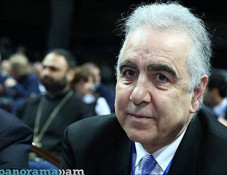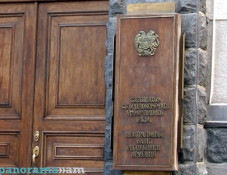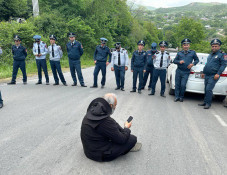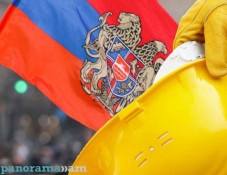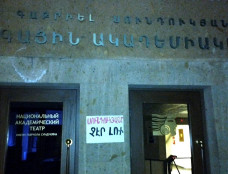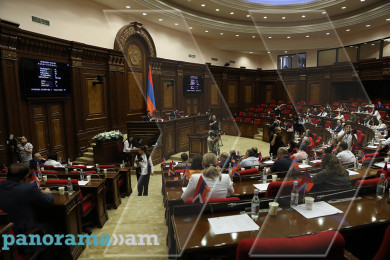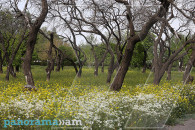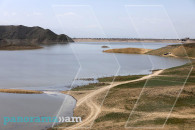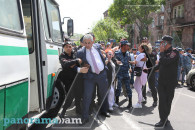
Azerbaijani sociologist: Aliyev’s regime can exist only in hothouse conditions of high oil incomes
Sergey Rumyantsev, a researcher at the Institute of Philosophy, Social Sciences and Law of the National Academy of Sciences of Azerbaijan, published a sociological essay titled “Azerbaijan’s Post-Soviet Modernization” on the Ukrainian history portal historians.in.ua, where he analyses the processes and mechanisms of the modernization of Azerbaijan and Azerbaijani people.
Pointing to the “many post-Soviet features” in the modern authoritarian political system of Azerbaijan, the author writes that, though in command of a powerful repressive apparatus, the political regime nevertheless does not have sufficient resources to fully suppress all of its opponents. “Despite all difficulties, there are opposition parties and movements, although it is true that their influence is diminishing every year. Despite all attempts of pressure and direct repressions, opponents of the government have access to some media outlets (newspaper and Internet). It is possible to publicly criticize the regime without finding yourself in a psychiatric hospital or a prison. This is not because the government does not want to send them to hospitals and prisons, but because they cannot afford to behave so," Rumyantsev points.
He argues that the incumbent Azerbaijani regime is weak. It is highly unlikely that this system can exist for 70 years like the Soviet Union. “The incumbent regime can exist only in the hothouse conditions of high incomes from oil and gas and mass emigration of people able to work. The incumbent political system in Azerbaijan is devoid of dynamism. It is unable to promptly respond and adjust to a situation that is constantly changing. Any more or less serious challenge (be it economic or political), which is inevitable some time in the future, can shatter the very foundations of this system and ultimately destroy it,” he highlights.
The author further refers to the increasing rates of imitation of many processes and political and economic institutions, claiming that the political and economic systems of Azerbaijan are an imitation of a modern state and a total imitation of modern political institutions and relations. Azerbaijan is an example of a simulacrum state, which imitates the negotiation process over the Karabakh conflict, as well as reforms and the struggle against corruption.
“The political regime in Azerbaijan is a complex of imitation practices, relations and ‘institutional camouflage’ that enable a broad international presentation of Azerbaijan privatized by a small group of people as a modern state that exists in reality,” the author argues.
Naming the main directions of the political system existing in Azerbaijan, the author notes that the current vector can be identified as “increasing anti-Europeanism or anti-Westernism.” The West, which used to be perceived as a role model in the 90s, is now transforming in to a threat to the Azerbaijani mode of prospering. It is viewed as a collective reference, which is under the influence of the powerful Armenian lobby and as the main sponsor of the Azerbaijani “fifth column,” which the government ideologists and media build of the so-called “radical opposition,” independent human rights defenders and, in a broad sense, all the critics of the regime.
The author points out that the entire Azerbaijani media has been writing about the double standards of the West since spring 2014, and by the summer of 2015 the accusatory anti-Western discourse had become extremely influential and highly demanded. “The interviews the highest-rank officials (heading the presidential administration and others) and the MPs give, the news reports and analytical articles tell the Azerbaijani resident about the West’s biased and unfair attitude towards the state of affairs in their country,” he writes.
Rumyantsev highlights that Azerbaijan sees the especially sharp anti-Western upsurges in periods when serious events of all-European significance take place. He brings up the example of the first European Games in 2015, as well as the Eurovision Song Contest Baku hosted in 2012. “A large-scale all-European event brings the country and its authoritarian regime under a closer scrutiny. Any criticism at the moment of euphoria from yet another recognition in the West brings about the Azerbaijani regime’s painful reaction. In June 2015, it became known that the Azerbaijani government was closing the OSCE coordinator’s office in Baku. That very step – hard to perceive as friendly – could be viewed as a new step towards cooling relations with the EU. Still, everything is not that simple in the policy of the Azerbaijani regime,” the author explains.
The main thesis of the regime’s anti-European statements is that there are only certain “enemies” which speak about the undemocratic nature of the Azerbaijani regime. The members of the “club” of those “enemies” are not considered to be the European countries themselves, “as some imaginary solidary cultural community,” but rather various international rights groups and foundations, certain critical politicians and parliamentarians, as well as a number of media outlets running critical videos and articles. They are constituting the very group positioned as “the enemies of the prospering Azerbaijan.”
Nonetheless, Azerbaijan also strains to get a recognition of the incumbent authorities’ legitimacy in the West, this pushing the Azerbaijani authorities to be more actively engaged in various “transnational contexts.” However, this brings about a reverse effect. The publicity focuses more attention to the country revealing its ins and outs amidst criticism of the ruling regime. “The political elite does not possess other discursive resources than those inherited from the Soviet past, hence it is capable of explaining the situation only as hostile intrigues. Subsequently, the ‘ungrateful’ West turns into some collective enemy like in the years of the Cold War,” the author highlights.
The political regime that has taken shape in Azerbaijan has shown over the past 10 years an obvious trend towards the conservation and reinforcement of authoritarian features. “After Heydar Aliyev’s departure, the authorities lost a charismatic leader, who was able to make some concessions to his opponents without fear of losing face. Ilham Aliyev has successfully retained power over the past 10 years, but has clearly shown that he is unable to make flexible political decisions,” Rumyantsev writes and adds that the main problem of the incumbent government is that they are confident of their own strength, stability, and impunity. However, every year in power only deepens contradictions that are being accumulated in the country. A revolution, not a peaceful transformation, is becoming increasingly more realistic every year.
“There are increasingly fewer resources for the latter. Most prominent opposition parties are on the verge of losing all the weight they still have not lost. There are a number of reasons why opposition activists are becoming as hereditary and clannish as the ruling regime,’’ Rumyantsev writes.
To be continued.
Sergey Rumyantsev is a sociologist, researcher at the Institute of Philosophy, Social Sciences and Law of the National Academy of Sciences of Azerbaijan and a postdoctoral research fellow at the Alexander von Humboldt Foundation, Humboldt University Institute of European Ethnology (Berlin). He chairs the independent network of social researchers “NOVATOR” in Baku.
Newsfeed
Videos





